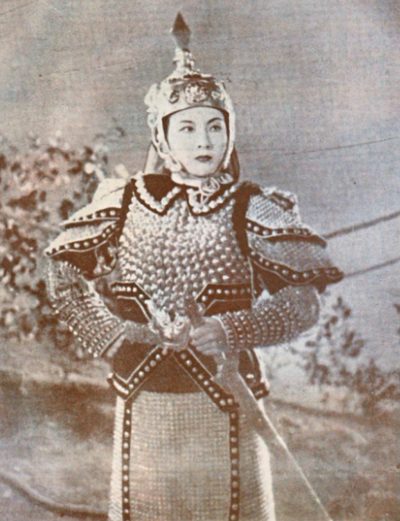★★★
“She’s in the army now…”
 Y’know, considering this is now more than eighty years old, this was likely better than I expected. Chen makes for a solid and engaging heroine, right from the start, when she tricks the residents of a nearby village, who demand she hand over the proceeds of her hunting [I am hoping the dead bird which plummets to the ground with an arrow through it, less than three minutes in, was a stunt avian…]
Y’know, considering this is now more than eighty years old, this was likely better than I expected. Chen makes for a solid and engaging heroine, right from the start, when she tricks the residents of a nearby village, who demand she hand over the proceeds of her hunting [I am hoping the dead bird which plummets to the ground with an arrow through it, less than three minutes in, was a stunt avian…]
Equally quickly, we begin to see wrinkles in the storyline, which might be unexpected if you have only seen the Disney versions. The first of these, is that Mulan’s deception here takes place with the agreement of her parents. She doesn’t sneak out with her father’s sword in the middle of the night, to take his place in the conscripted army of the Emperor. Her martial tendencies have been at least tacitly encouraged: according to Mom, it was her father who taught her the use of the bow and spear, since she was a little girl.
Mind you, with Mom saying things like, “Dying on the battlefield is much more glorious than dying at home,” no wonder Mulan comes up with the idea of being Dad’s stand-in. Her parents aren’t exactly happy about it, but they do understand the situation, and accept her decision. This pro-military stance is something which runs through much of the film. Before leaving, Mulan says, “Father, I thank you for teaching your daughter how to fight. You are allowing me to fulfill my duty to the country, and my filial duty to you… You have granted your daughter her dearest ambition – to be of some use to her country.”
Given this came out during the Japanese occupation of China, the theme of “Let’s all unite and do our part to defeat the invaders” seems rather brave. Though oddly, when the film was released, it provoked riots in which copies of the film were burned, due to rumours the director had collaborated with the Japanese to get it made.
The second most obvious change is the time-frame. Mulan doesn’t just knock off the barbarians and return home in a month or two. No, she goes career, eventually rising to become marshal of the army, due to her bravery and smarts, as well as helping uncover a double-agent high up in army command. It’s twelve years before she is able to see her parents again, though she looks suspiciously similar to when she left. It likely helps she doesn’t have to rise through the ranks, being able to inherit her father’s position as his “son.”
While the action quotient is, unsurprisingly, fairly low, there’s a cool bit where she goes on reconnaissance, dressed as a woman – so, a woman disguised as a man, pretending to be a woman. Got it. She is caught by two barbarian guards, but bursts into song, distracting them long enough to stab them to death. That’s a first, I think. Though I could have done without the further musical interlude at the end, the romance between Mulan and her long-time friend Liu Yuandu (Xi) is never over-powering, and is more a sidelight than the main attraction.
Obviously, its age and origin have to be taken into account, and expecting modern-day production values would be silly. Yet, allowing for everything, I’ve been considerably less entertained by many more recent films. The whole thing is now on YouTube, with English subtitles, and should you be interested, is embedded below.
Dir: Bu Wancang
Star: Chen Yunshang (Nancy Chan), Mei Xi, Han Langen, Liu Jiqun




